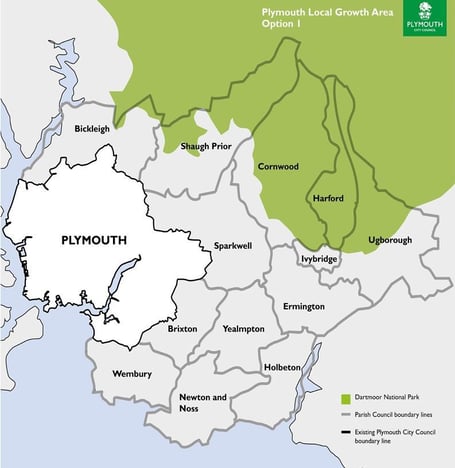Councillors in Plymouth will be asked later this month to vote on a proposal to divide Devon into four unitary authorities in a new-look local government model which includes the city council expanding into 13 parishes of the South Hams.
Under Labour’s plans to simplify local government and cut costs, county and district councils will be abolished and fewer but larger unitary councils will be responsible for all local services from education to waste and children and adult social care.
Over the summer Plymouth City Council held 13 ‘Big Community Conversation’ sessions in the places it wants to extend into – Bickleigh, Shaugh Prior, Sparkwell, Brixton, Wembury, Cornwood, Harford, Ugborough, Ivybridge, Ermington, Yealmpton, Holbeton and Newton and Noss and says these have “informed” its proposal.
The expansion will increase the population covered by the city council to 300,000, a size which is likely to find more favour with the government.
Plymouth is also proposing an expanded Exeter and Torbay authority plus a brand-new Devon Coast and Countryside authority covering the rest of the county.
At the full council meeting on November 24, all members will be asked to support this four-unitary plan before it is submitted to the government.
All councils in Devon have to submit their preferred option for local government reorganisation by November 28.
Ministers have asked for consensus in Devon but that will not be the case as Devon County Council and seven of the county’s district councils are likely to put forward different proposals when they finalise proposals and vote on them later this month.
Leader of Plymouth City Council Tudor Evans (Lab, Ham) said the four unitary model was “a smarter, more sustainable approach – one that recognises the vital role our cities play in driving growth and delivering services, while also ensuring that rural and coastal communities have the representation and support they need”.
“This is also a chance to reshape Plymouth in a way that reflects the reality of how people connect across our region. Our boundaries haven’t changed in over 50 years, yet every day we’re delivering services beyond them – from schools and hospitals to transport and housing.
“By welcoming 13 neighbouring parishes into an expanded Plymouth, we’re not just redrawing lines – we’re removing barriers. This proposal unlocks new opportunities for both the city and the surrounding rural areas, creating a single, joined-up authority that works better for everyone.”
But the move has been criticised by some as a “land grab” including Conservative MP for South West Devon Rebecca Smith, who represents parts of Plymouth, South Hams and West Devon.
Miss Smith, who is also a city councillor for Plymstock Radford, recently presented a petition of 1,800 local signatures against the plan in parliament disputing that this was “a modest expansion”.
She said many residents on the outskirts of the city in Plympton and Plymstock already felt “overtaxed and overlooked” by Plymouth City Council and “this land grab will make it worse still”.
She said South Hams District Council had put together its own proposal for local government reorganisation which “takes account of local residents’ wishes” and had got “clear local support”.
The 1-4-5 plan retains Plymouth unitary authority on its existing boundary; a new unitary authority combining the South Hams, Teignbridge and West Devon areas with Torbay and a new unitary authority including East Devon, Mid Devon, North Devon, Torridge and Exeter.
Whilst seven of the eight district councils in Devon have indicated support for the 1-4-5 plan, Exeter and Torbay councils have expressed support for the four model approach along with Plymouth.
Cllr Evans said that Plymouth was “the powerhouse of the South West”.
“It’s home to nationally significant defence assets, a thriving marine sector, and a track record of award-winning regeneration but to keep delivering, we need the scale and flexibility to grow.
“This proposal secures our long-term financial sustainability and strengthens our ability to support communities, attract investment, and deliver high-quality services.”
He said the council had “listened carefully” to rural concerns and “built a model that protects local identity, empowers parish councils, and ensures every voice is heard”.
Hundreds of residents and stakeholders across Plymouth and South Hams had engaged with the council during the ‘Big Community Conversation’
The council said that while some stakeholders expressed caution and concern, many were optimistic – recognising that the proposal could deliver real benefits not just for Plymouth, but for the wider region.
Feedback highlighted shared priorities across urban and rural communities: better transport, housing, healthcare, and local decision-making. The proposal responds directly to these concerns, with a governance model designed to empower communities and improve service delivery.
Plymouth’s final proposal will be discussed at the council’s scrutiny management board on Tuesday, November 12 followed by full council on November 24 and cabinet on the same day.
Subject to approval, it will be submitted to government on November 28 for its consideration. The government will have the final say on which plan goes ahead for Devon.
To find out more details on Plymouth’s proposal go to www.plymouth.gov.uk/lgr





Comments
This article has no comments yet. Be the first to leave a comment.